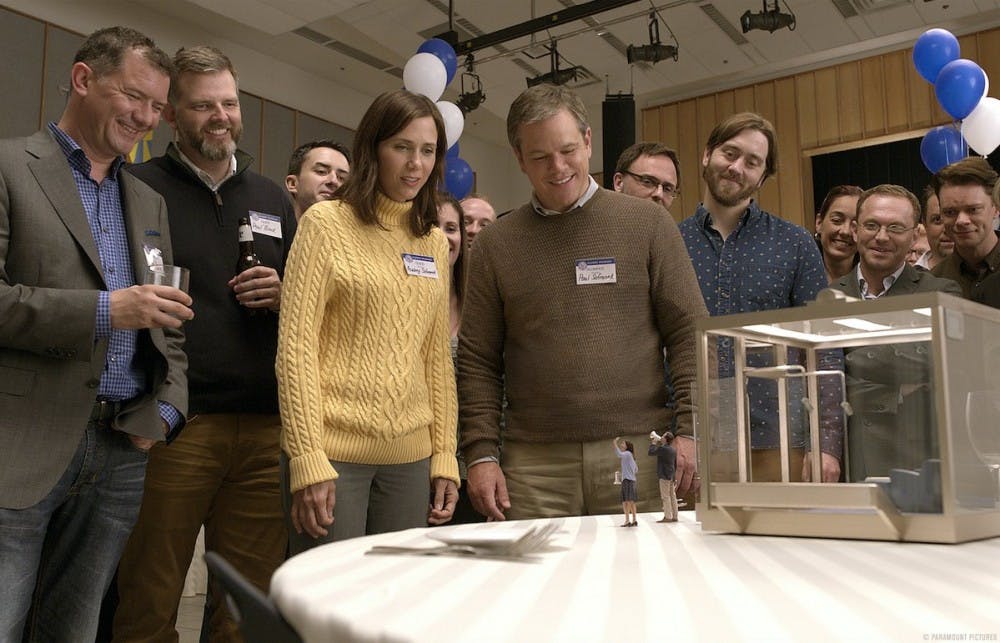For the first act of “Downsizing,” the film is utterly captivating. The movie follows the journey of Paul Safronic (Matt Damon) and his wife Audrey (Kristen Wiig) as they decide to undergo the process of “downsizing” and get shrunk down to a size of five inches. This process not only shrinks your body, but also your cost of living. For a couple thousand dollars in the “big” world, one can purchase a mansion in a special downsized community and live lavishly without needing to work. Paul and Audrey’s mere $150,000 net worth turns them into multimillionaires in a downsized community.
Director Alexander Payne is clearly trying to satirize the amount of waste and pollution modern consumerism has caused in the world. The film’s process of “Downsizing” was initially developed in order to counter the world’s overpopulation and waste problems — if someone is small, they produce little to no waste, but still manage to live a lifestyle that would be considered wasteful in the real world. It is a fascinating concept. How many of the world’s environmental problems could be solved if human consumption was effectively factored out of the equation?
However, there turns out to be a dark side to “Downsizing.” Oppressive regimes use the process to do away with rebels and protesters, and the extremely poor and marginalized endure the downsizing in an unregulated, dangerous manner in order to escape their poverty. However, these people usually end up ill and forgotten by the rest of the world.
“Downsizing” never follows through on its incredible set-up — after the first act, the film becomes pretty predictable. When it eventually comes time to undergo the procedure, Audrey backs out of the process, leaving Paul to fend for himself in the “small world.” Soon after, he meets Ngoc Lan Tran (Hong Chau), a Vietnamese social activist who was shrunk against her will for speaking out against the government. Chau is the comedic heart and soul of the movie. Her charisma onscreen is undeniable, as she provides most — if not all — of the film’s laughs with her exceptional delivery and comedic timing.
Chau’s character also serves as the emotional core of the movie — she spends her time helping out those who have been forgotten by the world. She brings food to the hungry, medicine to the sick and attempts to give a voice to those underrepresented in society. Chau has exceptional chemistry with Damon, and the scenes with both of them helping those in need are easily the best in the film.
Instead of giving the audience the unique criticism of commercialism that the movie was initially hinting at, “Downsizing” instead veers down a familiar narrative path of a man realizing he can use his life to help others instead of always helping himself. Paul goes through a self-redemptive arc where he finally realizes true satisfaction comes not through the things you possess, but the relationships you have with other people. This type of story is not inherently bad and is actually very well executed, with a lot of emotional highs and lows. The problem is this movie had the potential to be so much more. A successful satire about the woes of unchecked human consumption would have been very impactful and discourse-inducing in 2017. Instead, the film takes a safer route and delivers a simple story on the relationships between different groups of people, which is much easier for audiences to digest.
The ultimate problem with “Downsizing” is it provides way more questions than answers. Is it a movie about the detriments of consumerism? The negative effects humanity has on the environment? Or is it about the ways we treat marginalized groups of people? Payne’s film dips its toe into all of these themes but never fully commits on a direction.
At the very end of the movie, Payne tries to wrap up the film’s mishmash of themes by basically combining them all into one. The basic message plays off the film’s concept by saying we should remember the “little people” who have been marginalized by society, as well as the “little things” which make life important. The sentiment of this statement is an admirable one, but in the context of the movie, it feels trite and contrived. “Downsizing” has a lot of good ideas crammed into its two hour and 15 minute runtime, but it can never expand on or complete any of them. The result of it all is a pretty enjoyable film that doesn’t really say anything of importance in the end.





